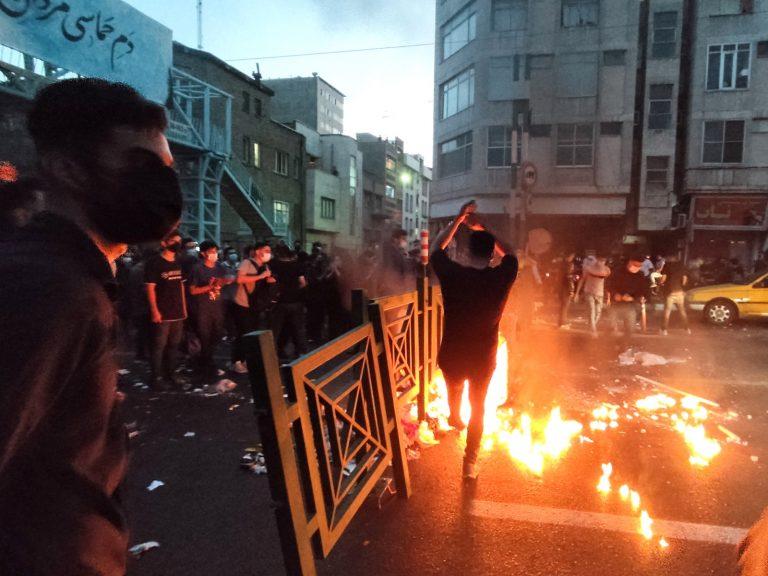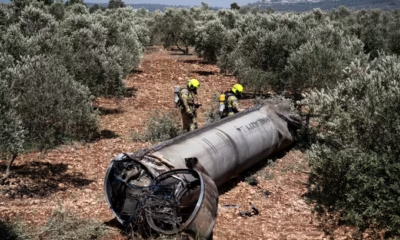Headline
Iran Sentences Three More To Death Over Protests

Iran has sentenced to death three more people, accused of killing three members of the security forces during the protests triggered by Mahsa Amini’s death, the judiciary said Monday.
The Islamic republic has been rocked by civil unrest since the September 16 death of Kurdish Iranian Amini, 22, following her arrest for allegedly violating Iran’s strict dress code for women.
The latest sentences, which can still be appealed, bring to 17 the total number of people condemned to death in connection with the more than three months of protests.
Four of those convicted have been executed and two others are on death row after their sentences were upheld by the country’s supreme court.
READ ALSO: Journalist Arrested, More Than 80 Media Workers Detained In Iran
Saleh Mirhashemi, Majid Kazemi and Saeed Yaghoubi were sentenced to death on charges of “moharebeh” — or waging “war against God” — under Iran’s Islamic sharia law, the judiciary’s Mizan Online news website reported.
In addition, they were all found guilty of belonging to a “criminal group with the intention of disrupting the security of the country”, a charge that carries a 10-year jail term.
Two others were handed prison terms for the incident that led to the deaths of the three security force members in the central province of Isfahan on November 16, Mizan said.
One of them is professional footballer Amir Nasr-Azadani, 26, who received sentences totalling 26 years in prison on three different charges including assisting in “moharebeh”.
According to Iranian law, however, he should serve them concurrently, meaning he would be behind bars for 16 years, it said.
Nasr-Azadani’s case and the risk of him being sentenced to death had raised alarm abroad, mainly by FIFPRO, the world union of professional footballers.
All the sentences announced can be appealed before the country’s supreme court, Mizan said.
Videos of the court sessions were published by Mizan, along with CCTV images purportedly showing the crimes being committed, and the confessions of the accused.
Iranian authorities say hundreds of people, including members of the security forces, have been killed and thousands arrested during the protests which they have generally labelled “riots”.
Tehran accuses hostile foreign countries and opposition groups of stoking the unrest.
On Saturday, Iran executed Mohammad Mehdi Karami and Seyed Mohammad Hosseini for killing a paramilitary force member in November, in Karaj west of Tehran.
READ ALSO: Iran Wins First Medal In Open Classic Powerlifting Championships
Two other men, Mohsen Shekari and Majidreza Rahnavard, were put to death in December after being convicted of separate attacks on security forces.
The executions have sparked global outrage and new Western sanctions against Tehran.
According to London-based rights group Amnesty International, Iran is second only to China in its use of the death penalty, with at least 314 people executed in 2021.
AFP
Headline
Trump Warns Of More Strikes In Nigeria If Attacks On Christians Continue

US President Donald Trump has warned that he could authorise additional military strikes in Nigeria if attacks against Christians continue, citing the security situation in the West African nation as a key concern.
In an interview with the New York Times on Thursday, Trump was asked whether the Christmas Day strikes in Sokoto State, which targeted Islamist militants, were intended as part of a broader campaign. “I’d love to make it a one-time strike. But if they continue to kill Christians, it will be a many-time strike,” he said.
READ ALSO:Russia, China Afraid Of US Under My Administration — Trump
Trump’s comments follow his 2025 designation of Nigeria as a “country of particular concern” due to what he described as an “existential threat” to its Christian population. The remarks have drawn criticism from Nigerian officials, who insist that jihadist groups target people regardless of religion. “Muslims, Christians and those of no faith alike” are affected, a government spokesperson said, rejecting claims that Christians are being singled out.
When pressed about reports that most victims of jihadist groups in Nigeria are Muslims, Trump responded, “I think that Muslims are being killed also in Nigeria. But it’s mostly Christians.” Nigeria, with a population exceeding 230 million, is roughly evenly divided between Christians in the south and Muslims in the north.
The December strikes targeted camps run by a jihadist group known as Lakurawa in Sokoto, a largely Muslim region near the border with Niger. Both the US and Nigerian authorities have linked the militants to Islamic State-affiliated groups in the Sahel, although the IS has not formally claimed any association with Lakurawa. Details of casualties from the strikes remain unclear, as neither government has provided official figures.
Nigeria’s Foreign Minister Yusuf Maitama Tuggar said the operation was a “joint effort” and emphasised that it was not motivated by religion. He confirmed that the strikes had the approval of President Bola Tinubu and included
participation by Nigerian armed forces. Addressing the timing of the strikes, Tuggar added that they were unrelated to Christmas, though Trump described them as a “Christmas present”.
Headline
Science Discovers Why Hungry, Broke Men Prefer Bigger Breasts

A scientific study has found that men who feel financially insecure or hungry are more likely to find larger female breasts attractive.
The research was published in the peer-reviewed journal PLOS ONE and was conducted by psychologists Viren Swami and Martin J. Tovée.
The study examined whether breast size acts as a signal of fat reserves and access to resources, and whether men facing resource insecurity rate larger breast sizes as more attractive than men who feel economically secure.
Researchers carried out two separate studies across Malaysia and the United Kingdom.
In the first study, 266 men from three areas in Malaysia were assessed. The locations represented low, medium and high socioeconomic backgrounds. Participants were shown rotating computer-generated images of women with different breast sizes and asked to rate which they found most attractive.
READ ALSO:Wike: Why Removing Fubara Will Be Difficult – Ex-Commissioner
The findings showed a clear socioeconomic pattern.
Men from low-income rural areas preferred larger breasts.
Men from middle-income towns preferred medium to large breasts.
Men from high-income urban areas preferred smaller to medium breasts.
PLOS ONE study showing how hunger and financial insecurity affect men’s breast size preferences
Cover page of a PLOS ONE study examining how resource insecurity influences men’s breast size preferences. Source: PLOS ONE
As stated in the study, “Men from relatively low socioeconomic sites rated larger breast sizes as more physically attractive than did participants in moderate socioeconomic sites, who in turn rated larger breast sizes as more attractive than individuals in a high socioeconomic site.”
READ ALSO:Rare 1937 ‘Hobbit’ Discovered In House Clearance Sells For $57,000
The researchers noted that the lower a man’s financial security, the stronger his preference for larger breast size.
The second study focused on hunger rather than income.
In Britain, 124 male university students were divided into two groups. Sixty-six participants were classified as hungry, while 58 had recently eaten. Both groups viewed the same breast size images under identical conditions.
Hungry men consistently rated larger breasts as more attractive than men who were full.
READ ALSO:‘I Discovered My Husband Was Sterile 5 Yrs After We Got Married’
According to the researchers, “Hungry men rated a significantly larger breast size as more physically attractive than did the satiated group. Taken together, these studies provide evidence that resource security impacts upon men’s attractiveness ratings based on women’s breast size.”
The researchers explained that these shifts suggest attraction is not fixed but responsive to immediate conditions.
They noted that men experiencing hunger or financial pressure may place greater value on physical traits that signal access to resources or stability.
The study added that temporary states such as hunger can shape attraction in the same way long-term economic conditions do, reinforcing the idea that social and environmental factors play a key role in how physical attractiveness is judged.
Headline
Man With Lengthy Criminal Record Shoots Nigerian To Death Inside Bus In Canada

A 40-year-old man with an extensive criminal history has been charged with first-degree murder after a Nigerian national was shot dead on a GO bus at the Yorkdale GO Bus Terminal in Toronto, marking the city’s first homicide of 2026.
Toronto Police, in a statement on their website, said officers were called to the terminal, near Yorkdale Road and Allen Road, at about 7 p.m. on Sunday, January 4, following reports of a shooting. Investigators allege that both the suspect and the victim boarded a GO bus at the terminal, where the suspect shot the victim before fleeing the scene on foot.
According to the statement, officers arrived to find a man suffering from a gunshot wound, but despite carrying out life-saving measures, the Nigerian was pronounced dead at the scene.
The victim was later identified as Osemwengie Irorere, a 46-year-old man from Nigeria, the Toronto police said in a later statement.
READ ALSO:Canada Flags Nigeria, 16 African Countries As High-risk In New Travel Advisory
Local media reports noted that an eyewitness who was seated just behind the victim said the bus had been dark and crowded as passengers waited to depart when a single gunshot rang out.
“I assumed it was a popped tyre or something, but immediately after, a guy sitting in front of me got up, shoved his hands in his pocket and ran off the bus,” the witness said, requesting anonymity for safety reasons.
“Right after, I stood up and I looked at the seat in front of me and I saw a guy, bleeding,” he added, saying he could smell smoke in the air after the shot was fired.
Police said the suspect was located and arrested a short time later near the Yorkdale subway station, and a firearm was recovered.
READ ALSO:Nigerian Musician Dies In Canada
The accused has been identified as Tyrel Gibson, 40, of Toronto. He appeared at the Toronto Regional Bail Centre on Monday, January 5.
Court documents show that Gibson has a lengthy criminal record dating back to 2000, with nearly two dozen charges. He has previously been convicted of offences including attempted murder and firearm-related crimes. In 2015, he pleaded guilty to aggravated assault, using a firearm, possession of a firearm with ammunition and possession of an unauthorised firearm and was handed a lifetime weapons prohibition. He was sentenced to eight years in prison in 2017, although it remains unclear how much of that term he served.

 News3 days ago
News3 days agoHow To Calculate Your Taxable Income

 Metro3 days ago
Metro3 days agoEdo widow-lawyer Diabolically Blinded Over Contract Seeks Okpebholo’s Intervention

 Headline3 days ago
Headline3 days agoRussia Deploys Navy To Guard Venezuelan Oil Tanker Chased By US In Atlantic

 Politics2 days ago
Politics2 days agoAPC Leaders, Tinubu/Shettima Group Call For Wike’s Removal As FCT Minister

 Metro4 days ago
Metro4 days agoJUST IN: Court Grants Malami, Wife, Son N500m Bail Each

 Entertainment3 days ago
Entertainment3 days agoVIDEO: ‘Baba Oko Bournvita,’ Portable Drags His Father, Alleges Bad Parenting, Extortion

 Politics3 days ago
Politics3 days ago2027: Details Of PDP Leaders, Jonathan’s Meeting Emerge

 Politics2 days ago
Politics2 days agoWike A ‘Pestilence’ On Rivers, I Resigned Because Of It – Ex-Commissioner

 News3 days ago
News3 days agoExpert Identify Foods That Increase Hypertension Medication’s Effectiveness

 Headline1 day ago
Headline1 day agoScience Discovers Why Hungry, Broke Men Prefer Bigger Breasts






























